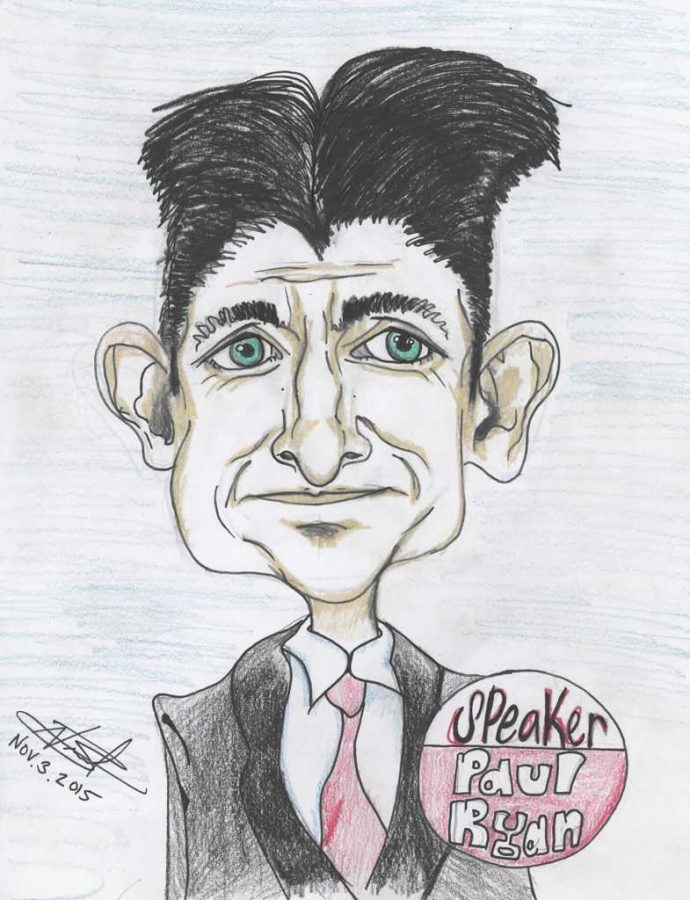When you think of the “ultimate affable nerd jock,” few people come to mind, least of all, current Speaker of the U.S. House of Representatives, Paul Ryan.
Regardless, Washington, D.C., lobbyist Kathryn Lehman recently used the phrase in an interview with the Washington Post. She was trying to describe Ryan in the wake of his Oct. 29 election as speaker.
Calling Ryan a “nerd jock” is more whimsical than most pundits’ speculation about the new speaker’s personality and leadership style. The description shows the difficulty politicians have determining their feelings toward Ryan.
Unfortunately for moderate Republicans and Democrats hoping for a return to a functional Congress, Ryan’s first few days in his new position seem to confirm a widespread fear that a change in leadership won’t change much. The new speaker will be a figurehead for conservatives in Congress, but not much else.
As Ryan said Sunday on NBC’s Meet the Press that he hoped to return the GOP to its lost status of a “proposition party,” he simultaneously announced he would delay anticipated immigration reform until President Barack Obama leaves office.
“I don’t think we can trust the president on this issue,” Ryan said, “I do not believe we should advance comprehensive immigration legislation with a president who has proven himself untrustworthy on this issue.”
It’s hard to imagine how anti-immigration activists, like the Tea Party Patriots’ Jenny Beth Martin, would take issue with such a statement, which is precisely the purpose of the maneuver.
The new speaker’s insistence on being what he called a “unifying figure” in an Oct. 20 press conference doesn’t mean that he will actively try to create consensus among the GOP’s congressional ranks. Rather, Ryan’s idea of consensus is a passive acceptance of the position the loudest in the party advocate. Ryan doesn’t want to deal with the difficulties of keeping the far-right under control.
Rep. Mo Brooks, R-Alabama, cast his vote for Ryan as speaker only if Ryan promised to block any immigration bill that the majority of Republican House members didn’t support, which he has.
“I need your assurance that you will not use the speaker’s position to advance your immigration policies,” Brooks wrote in an open letter to Ryan last Tuesday. Ryan was part of the 2013 push to pass bipartisan immigration reform, which included a pathway to citizenship for undocumented immigrants.
On the surface, betraying a career-long support for immigration reform for the mere promise of one vote in an election for speakership seems like an unlikely choice for Ryan. But putting aside that Brooks, as leader of the powerful House Freedom Caucus, likely influences other votes beyond his own, Ryan’s rationale for sacrificing ideological authenticity says something important about what we can expect from the House he will lead.
Ryan doesn’t really want the job. His reluctance to take it in the first place wasn’t an attempt to make a show of things. Tuesday night the new speaker told reporters, “I cannot, and I will not, give up my family time.”
The speaker is also notorious for being a “wonk’s wonk,” according to Paul Waldman, a blogger for The Washington Post, deeply invested in the minutiae of the issues themselves and less so in the politics of negotiating real compromise in the House on those issues.
These traits explain Ryan’s insistence on consensus during his term and among the Republican caucus in the House. Although legislative leaders chose Ryan to be more than a “caretaker” of the speakership until the 2016 elections, it seems that will be the extent of his leadership.
One of the promises Ryan made to secure the support of the influential conservative House Freedom Caucus in his bid for the position was a shift to a “bottom-up approach” in the party’s decision-making process. He’s already made good on this promise with the highway bill the House debated on Tuesday, which saw a freewheeling and open amendment process that empowered individual lawmakers. The concession ensured Ryan the speakership, and won their good graces. It also means Ryan won’t have to fight the party former Speaker John Boehner left to him.
Boehner left office with a 33 percent to 47 percent favorable to unfavorable rating in a CNN poll conducted Oct. 14 to 17. He took up the speaker’s gavel in 2011 in a room of new, conservative Tea Party representatives he couldn’t control.
The former speaker’s caving to Tea Party members of his own party notably led to the 2013 government shutdown after House Republicans failed to defund ObamaCare. Despite his accommodations, Boehner was never popular with the Tea Party populists . Donald Trump, who represents much of the same movement, uttered a relieved, “It’s time,” in response to news of Boehner’s resignation.
No doubt, Ryan is making a good decision for his own physical and mental health by shirking the full responsibilities of speaker by formulating policies that will never get out of Congress. But Ryan’s absentee-style leadership in the House will have the same results of Boehner’s anarchy. The Tea Party and the far-right faction of the GOP will continue to hold the nation’s legislature hostage.
In the Oct. 14 to 17 CNN poll, CNN also asked respondents whether they believed a change in congressional leadership would “bring real reform to the way Congress operates.” Sixty-two percent of respondents were skeptical of real change. Only 34 percent expected reform.
As far as Ryan’s preliminary stances on immigration go, the majority were right to believe that real change in Congress will have to wait.
The new speaker may have all the novelty of the “ultimate affable nerd jock,” but his leadership style as speaker will be just as stale as Boehner’s.
Henry primarily writes on government and domestic policy for The Pitt News.
Write Henry at [email protected].


